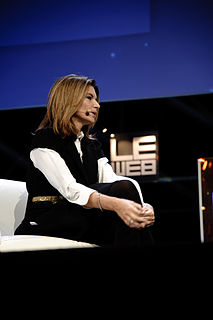A Quote by Andi Zeisler
We are conditioned to be consumers since birth. I still think it's kind of incumbent on us as consumers to know the difference between something that's truly progressive and something that's just trying to get us to buy a product. Capitalism, ultimately, it's not about equality, it's not about social justice.
Related Quotes
Consumers will purchase high quality products even if they are expensive, or in other words, even if there are slightly reasonable discount offers, consumers will not purchase products unless they truly understand and are satisfied with the quality. Also, product appeal must be properly communicated to consumers, but advertisements that are pushed on consumers are gradually losing their effect, and we have to take the approach that encourages consumers to retrieve information at their own will.
Consumers fall in love with a brand and it's important for a brand to develop and stretch itself to provide for their consumers. I don't suspect that a customer will walk into a store to buy a pair of jeans and end up buying a sofa, but it's about providing loyal consumers with a choice to create a lifestyle.
But the voice goes on, calling us, beckoning us, luring us to think that there might be such a thing as justice, as the world being put to rights, even though we find it so elusive. We're like moths trying to fly to the moon. We all know there's something called justice, but we can't quite get to it.
The capitalistic social order, therefore, is an economic democracy in the strictest sense of the word. In the last analysis, all decisions are dependent on the will of the people as consumers. Thus, whenever there is a conflict between the consumers' views and those of the business managers, market pressures assure that the views of the consumers win out eventually.
If consumers weren't thinking this way, companies would be a lot less responsive. Right now, consumers don't really have a way to get information about where exactly their clothing is coming from - that's a barrier. We have labels on your eggs, "cage-free hens." They need to get something along those lines to allow the consumer to discriminate.
We've now become conscious of the uncalculated social, economic, and environmental costs of that kind of "unconscious" capitalism. And many are beginning to practice a form of "conscious capitalism," which involves integrity and higher standards, and in which companies are responsible not just to shareholders, but also to employees, consumers, suppliers, and communities. Some call it "stakeholder capitalism."
But there is nothing idealized or romantic about the difference between a society whose arrangements roughly serve all its citizens (something otherwise known as social justice) and one whose institutions have been converted into a stupendous fraud. That can be the difference between democracy and plutocracy.
There's a grosser irony about Politically Correct English. This is that PCE purports to be the dialect of progressive reform but is in fact - in its Orwellian substitution of the euphemisms of social equality for social equality itself - of vastly more help to conservatives and the US status quo than traditional SNOOT prescriptions ever were.
If old consumers were assumed to be passive, then new consumers are active. If old consumers were predictable and stayed where you told them, then new consumers are migratory, showing a declining loyalty to networks or media. If old consumers were isolated individuals, then new consumers are more socially connected. If the work of media consumers was once silent and invisible, then new consumers are now noisy and public.

































